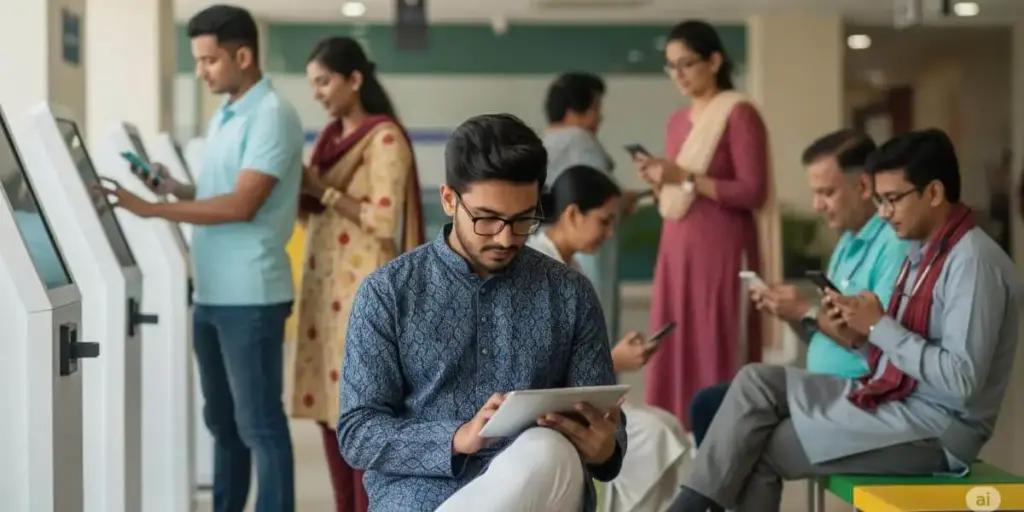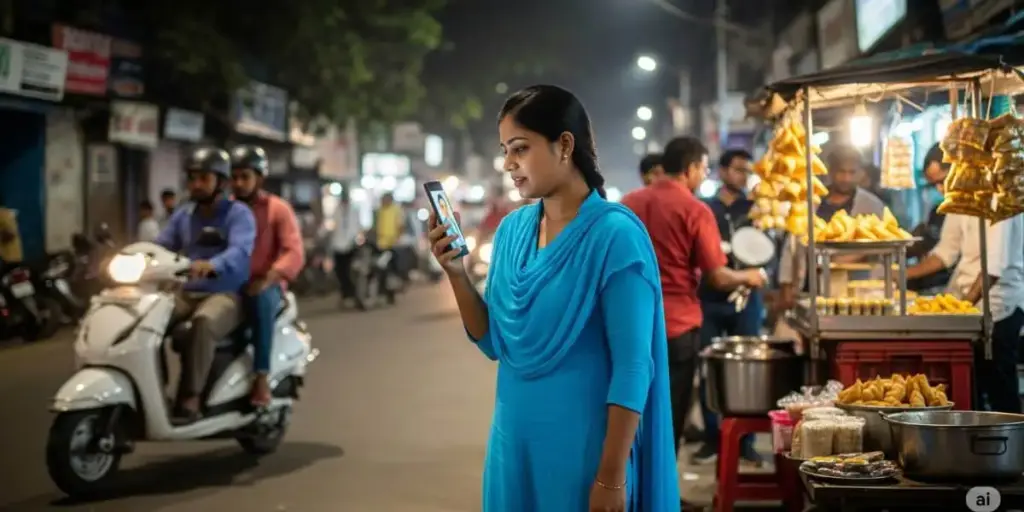Table of Contents
In recent years, digital healthcare in India has undergone a phenomenal transformation. From traditional doctor-patient interactions to tech-enabled care delivery, this sector is witnessing a revolution in the making. With the integration of Artificial Intelligence, telemedicine, electronic health records (EHR), mobile health applications, and wearable devices, digital healthcare in India is evolving into a seamless and accessible ecosystem that’s empowering patients and enhancing efficiency across the healthcare spectrum.

Understanding Digital Healthcare in India
Digital healthcare in India refers to the use of technology to deliver healthcare services remotely, improve clinical workflows, streamline medical data, and empower patients with personalized health tools. This includes platforms like eSanjeevani, online doctor consultations, AI-powered diagnostics, electronic health records, and mobile health applications.
The digital healthcare in India movement was significantly accelerated by the COVID-19 pandemic, which highlighted the urgent need for contactless, efficient, and accessible care. With over 1.4 billion people, India represents a massive opportunity—and challenge—for delivering healthcare through digital means.
The Rise of Telemedicine
One of the cornerstones of digital healthcare in India is telemedicine. Platforms like Practo, 1mg, and MFine allow patients to consult doctors via video calls, chat, or voice, reducing the need for in-person visits.
The Ministry of Health launched the eSanjeevani platform, enabling over 100 million consultations till date. Telemedicine bridges the urban-rural healthcare divide, enabling access to specialist care in remote locations where doctors are scarce.
Government Initiatives Fueling the Digital Healthcare Ecosystem
The Indian government has played a pivotal role in fostering digital healthcare in India. Key programs and frameworks include:
Ayushman Bharat Digital Mission (ABDM)
Launched in 2021, the ABDM aims to create a national digital health ecosystem that connects hospitals, labs, pharmacies, and patients through a unique Health ID. It promotes interoperability, transparency, and better health outcomes.
National Health Stack
Proposed by NITI Aayog, this stack provides a digital backbone for managing health data, insurance claims, and health registries.
Telemedicine Practice Guidelines
Issued by the Medical Council of India in collaboration with NITI Aayog, these guidelines standardize remote consultations and have enabled widespread adoption of digital healthcare in India.
Artificial Intelligence and Machine Learning in Healthcare
AI and ML are transforming how diagnoses are made, diseases are predicted, and treatment plans are devised. In digital healthcare in India, AI is being used for:
- Predictive analytics in chronic diseases like diabetes and cancer
- Radiology and imaging interpretation
- Chatbots for patient queries and triage
- Drug discovery and genomics
Companies like Qure.ai and Niramai are using AI to revolutionize diagnostics, especially in rural and underserved regions.
Role of HealthTech Startups
India has seen a boom in HealthTech startups focusing on digital healthcare in India. These startups provide innovative solutions that range from remote consultations to AI-based diagnostics.
Top HealthTech Innovators:
- PharmEasy – Online medicine delivery and diagnostics
- Cure.fit – Fitness and mental wellness
- HealthifyMe – AI-driven diet and fitness plans
- Docprime – Insurance-backed teleconsultation services
These companies are not only driving innovation but are also helping create a more inclusive and robust digital healthcare in India.
Digital Health Records and Data Integration
The backbone of digital healthcare in India lies in seamless data management. Electronic Health Records (EHRs) and Personal Health Records (PHRs) allow for:
- Improved diagnosis accuracy
- Reduced repetition of diagnostic tests
- Better coordination among healthcare providers
- Long-term health monitoring
The Ayushman Bharat Digital Mission is pioneering this integration by enabling individuals to store, access, and share their digital health data securely.
Mobile Apps and Wearables: Healthcare in Your Pocket
The increasing penetration of smartphones has enabled digital healthcare in India to flourish through mobile applications and wearables.
Popular Apps:
- Fitbit, Apple Health, and GOQii for fitness tracking
- Tata Health and Apollo 24|7 for medical consultations
- Aarogya Setu – India’s pandemic surveillance app
These tools allow real-time health monitoring, medication reminders, heart rate tracking, and more. They encourage proactive and preventive healthcare.
Challenges in Adopting Digital Healthcare in India
Despite its rapid growth, digital healthcare in India faces several challenges:
Digital Divide
Access to smartphones, internet, and digital literacy is still limited in rural areas, which affects equitable healthcare delivery.
Data Privacy and Security
Handling sensitive health data raises concerns about privacy, consent, and cybersecurity. Strong regulations and encryption standards are required.
Resistance to Change
Healthcare professionals and institutions may be slow in adopting new technologies due to lack of training or perceived complexity.
Interoperability Issues
Integrating data across multiple platforms and ensuring standardization is still a work in progress in digital healthcare in India.
The Future of Digital Healthcare in India
The future of digital healthcare in India is undeniably promising. With the integration of emerging technologies like:
- Blockchain for secure patient data
- 5G for ultra-fast telemedicine consultations
- IoT for remote patient monitoring
- Virtual Reality (VR) for medical education and therapy
…India is poised to become a global leader in digital health innovation.
The National Digital Health Blueprint outlines a 10-year vision, aiming to make healthcare accessible, affordable, and equitable through technology.
Conclusion
Digital healthcare in India is not just a trend—it’s a revolution that’s reshaping the healthcare landscape. By leveraging technology, India is overcoming its long-standing challenges of accessibility, affordability, and quality. The combined force of government policies, private sector innovation, and increasing public awareness ensures that the future of digital healthcare in India is bright, inclusive, and transformative.
Frequently Asked Questions (FAQs)
Q1: What is digital healthcare?
Digital healthcare in India refers to the use of technologies like telemedicine, electronic health records, AI, and mobile apps to deliver healthcare services efficiently, especially in remote and underserved areas.
Q2: What are the benefits of digital healthcare in India?
The benefits include increased accessibility to doctors, reduced healthcare costs, better management of health data, and faster diagnoses using AI and digital tools.
Q3: How is the Indian government supporting digital healthcare?
The Indian government supports digital healthcare in India through initiatives like the Ayushman Bharat Digital Mission, eSanjeevani platform, and the National Health Stack, which promote digital health infrastructure and accessibility.
Q4: What are some top digital healthcare startups in India?
Some of the leading digital healthcare startups in India include PharmEasy, Feliz.Health, Practo, HealthifyMe, Cure.fit, MFine, and Niramai, offering services from e-pharmacy to AI-based diagnostics.
Q5: How does telemedicine benefit rural healthcare in India?
Telemedicine in India bridges the healthcare gap in rural areas by offering remote consultations, diagnostics, and follow-ups, reducing travel time and costs.
Q6: What is the Ayushman Bharat Digital Mission (ABDM)?
The Ayushman Bharat Digital Mission is a government initiative to digitize health records and connect patients, providers, and payers in a unified digital ecosystem.
Q7: How is AI used in digital healthcare in India?
AI in Indian healthcare is used for faster diagnosis, personalized treatment plans, radiology analysis, and predictive health models for chronic disease management.
Q8: What are the challenges of implementing digital health in India?
Major challenges include digital literacy, internet access, data privacy, and interoperability among healthcare systems and apps.
Q9: Are electronic health records (EHRs) mandatory in India?
While EHRs in India are not yet mandatory across all providers, the government is strongly encouraging adoption through ABDM and health tech policies.
Q10: What is the future of digital healthcare in India?
The future of digital healthcare in India includes widespread use of AI, 5G, IoT, VR, and blockchain, promising more accessible, affordable, and patient-centric care.








